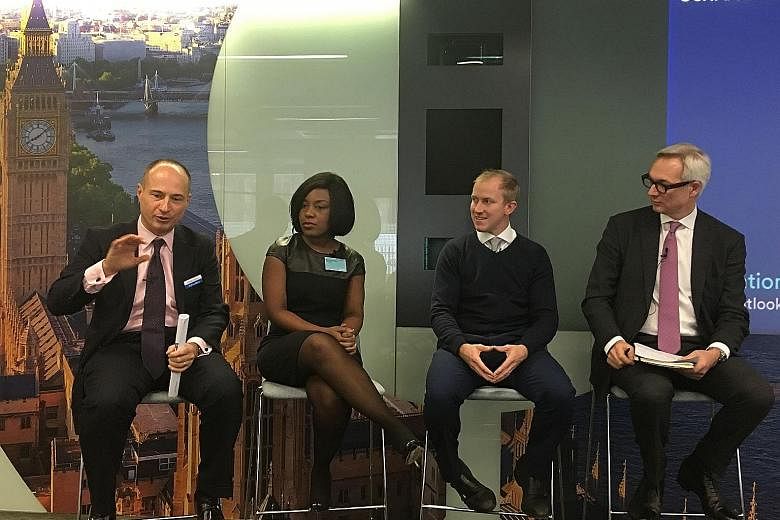With growth picking up across the world, some Schroders fund managers are getting concerned over the risk of inflation bursting what they call a bubble in the bond market.
But as professional fund managers, they are pragmatic about elevated valuations, noting it does not pay to get out too early. Meanwhile, there are still pockets of value, they said.
The comments came at an annual briefing in London in the middle of last month by Schroders, a large asset manager headquartered there.
"Although everyone is cautious, everyone still needs a return... you're not being paid to be cautious too early," said multi-asset fund manager Remi Olu-Pitan.
She noted that timing when the credit bubble will pop is difficult, and people are desperate to invest as the alternatives do not yield much. "There will be a time, maybe when central banks start to raise interest rates, where the opportunity cost to be defensive is better."
Mr Philippe Lespinard, co-head of fixed income, said bond markets are too complacent that a fantastic growth cycle will happen without inflation coming back.
He stays away from the investment-grade bonds in the bond benchmark adding that there is value still in emerging market bonds, local currency bonds and asset-backed securities.
"We also limit capacity. We don't take more money than what we can manage efficiently," he said, pointing out that the house's Europe corporate bond fund had been closed to investors for about a year.
Since the global financial crisis and a resulting zero interest rate policy by central banks around the world to restore growth, financial markets have been wondering whether wages and consumer prices will be stuck in a rut forever. This is even as asset prices have soared.
Schroders chief economist Keith Wade said that in the US, there is scope for wages to move up gradually. This is because the job market has not hit capacity constraints yet given the large post-crisis fall in the labour participation rate, he said.
In Europe, there also remains much spare labour capacity, and there can be strong growth for a year or two before inflation returns.
Even if general prices start to rise, asset prices may not necessarily be negatively affected, said Ms Olu-Pitan, the multi-asset fund manager. "As long as there's an upside surprise in prices based on strong growth, then it's not necessarily a bad thing," she said.
By contrast, the wrong type of inflation can come from trade wars, currency volatility and commodity price increases. This situation can occur without better growth, and presents some worry for financial markets next year, she said.
European equities fund manager James Sym said valuations in his field are high relative to history, which is no surprise.
"People were forced out of government bonds into Nestle yielding less than zero, then forced into high yield, then forced into multi-asset, and finally, European equities," he quipped, to laughter.
He thinks that inflation is returning, and has positioned his fund in financials, telcos and other stocks for that eventuality. French telco Orange, for instance, can enjoy higher cash flows as earnings go up and capital expenditures go down, he said.
Banks are in a much better position than 10 years ago, with much improved capital. Their profits can improve once quantitative easing comes to an end.
And car companies like Renault, trading at five times earnings, are in a "clear pocket of value", he said.
He visited 500 companies in the last 12 months, and found them in a cheery mood. "Which is a problem. When everybody is positive, the only way is down," he said.
Asked about bitcoin, the cryptocurrency that soared eight-fold this year, Mr Sym said: "I wasn't investing in the 2000 bubble, I didn't see the ridiculous extremes, but it's nice to witness one firsthand."


